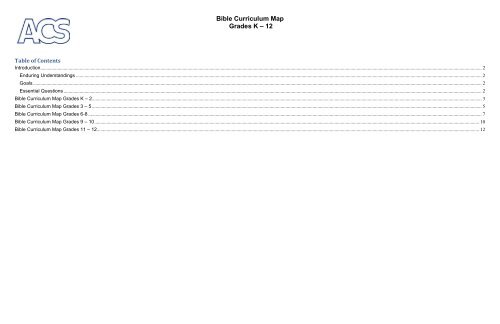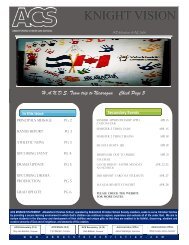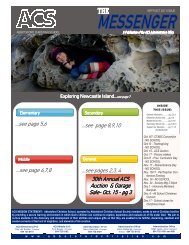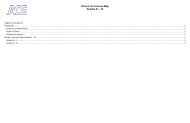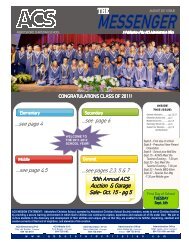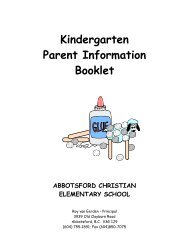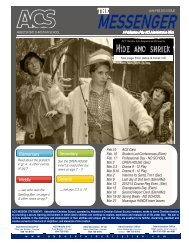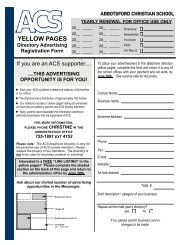Bible Curriculum Map.1 - Abbotsford Christian School
Bible Curriculum Map.1 - Abbotsford Christian School
Bible Curriculum Map.1 - Abbotsford Christian School
You also want an ePaper? Increase the reach of your titles
YUMPU automatically turns print PDFs into web optimized ePapers that Google loves.
<strong>Bible</strong> <strong>Curriculum</strong> Map<br />
Grades K – 12<br />
Table of Contents<br />
Introduction ........................................................................................................................................................................................................................................................................................................................................................................ 2<br />
Enduring Understandings ........................................................................................................................................................................................................................................................................................................................................... 2<br />
Goals .............................................................................................................................................................................................................................................................................................................................................................................. 2<br />
Essential Questions ..................................................................................................................................................................................................................................................................................................................................................... 2<br />
<strong>Bible</strong> <strong>Curriculum</strong> Map Grades K – 2 .............................................................................................................................................................................................................................................................................................................................. 3<br />
<strong>Bible</strong> <strong>Curriculum</strong> Map Grades 3 – 5 .............................................................................................................................................................................................................................................................................................................................. 5<br />
<strong>Bible</strong> <strong>Curriculum</strong> Map Grades 6-8 ................................................................................................................................................................................................................................................................................................................................. 7<br />
<strong>Bible</strong> <strong>Curriculum</strong> Map Grades 9 – 10 .......................................................................................................................................................................................................................................................................................................................... 10<br />
<strong>Bible</strong> <strong>Curriculum</strong> Map Grades 11 – 12 ........................................................................................................................................................................................................................................................................................................................ 12
Introduction<br />
Mission Statement<br />
<strong>Abbotsford</strong> <strong>Christian</strong> <strong>School</strong>, operated by <strong>Abbotsford</strong> <strong>Christian</strong> <strong>School</strong> Society members, seeks to serve <strong>Christian</strong> families by providing a secure learning environment in which God’s<br />
children can continue to explore, experience and evaluate all of life under God.<br />
We aim to nurture students in the discovery and development of their abilities and unique gifts so that they are enabled to be faithful, discerning, obedient and creative servants of God<br />
and of neighbour; and stewards of His creation.<br />
Enduring Understandings<br />
Faith is the foundational core that guides and shapes each person's life. For <strong>Christian</strong>s, faith is a conviction that God created the world, upholds creation with His voice, continually supplies us with grace and, through<br />
His word, provides specific and general guidelines for human life in the creation. This deep-rooted assurance, through the work of the Holy Spirit, enables each person to respond to God in trust and with obedience.<br />
Discipleship grows out of faith.<br />
Our curriculum is an expression of our response to God's invitation to faith in Jesus Christ. Students, moved by the Holy Spirit, come to trust and serve God as they learn how God reveals Himself in creation, in the<br />
<strong>Bible</strong>, and through Jesus Christ.<br />
Biblical Studies introduce students to the most significant insights and ideas of the <strong>Bible</strong> and our <strong>Christian</strong> heritage. Students explore the drama of covenant history as it moves from Genesis through Revelation. They<br />
study the promises of the Old Testament and the fulfillment in Christ of the New Testament. They learn a Biblical view of man, woman and child created as image bearers of God, both as sinners and as saints. Biblical<br />
themes such as salvation, grace, faith, covenant, kingdom, church, world, salvation, judgment, law, and gospel are developed. Students see that the <strong>Bible</strong>’s message applies to all areas of life including knowledge,<br />
love, human relationships, government, war and peace, and justice. They learn how God’s people through the ages have responded to God’s call on their lives.<br />
Equipped with this knowledge, students will be challenged, in all disciplines, to discern what role they play in the continuing story, practice lives of service and find pleasure in knowing that God desires them and their<br />
obedient participation. By developing their critical awareness and consciousness, students respond to God's call in their own personal and community contexts.<br />
Goals<br />
1. Students will understand that they are part of the continuing story of God and His people, are called to discern their place in it, practice lives of service, and find pleasure in knowing that God desires them and<br />
their obedient participation.<br />
2. Students will know key biblical passages, characters, and events.<br />
3. Students will know how to read the <strong>Bible</strong> – understanding the historical, geographic and cultural contexts; knowing the <strong>Bible</strong>’s organization and types of literature; using appropriate reference materials.<br />
4. Students will understand various <strong>Christian</strong> and non-<strong>Christian</strong> religious views.<br />
5. Students will understand what the <strong>Bible</strong> teaches about God, truth, God’s creation and people.<br />
6. Students will understand that the story of God and His people has continued throughout history.<br />
7. Students will apply biblical teaching to all life and learning.<br />
Essential Questions<br />
1. What is the story of God walking with His people<br />
2. What is God teaching me in His word<br />
3. How should I read the <strong>Bible</strong><br />
4. How have people through the ages responded to God’s call on their lives<br />
5. What is my place in the continuing story of God and His people<br />
6. How can I serve God<br />
7. How does biblical teaching make a difference in my life and learning
<strong>Bible</strong> <strong>Curriculum</strong> Map Grades K – 2<br />
Planning for Assessment (Teaching Strategies), Assessment Indicators (Assessment Activities) and resources are listed in course overviews<br />
Grade<br />
Essential Questions<br />
Course or Unit<br />
Content Learning Outcomes: By the end of the grade level, the students will: Some Practical Applications<br />
In many grades, practical applications<br />
are tied to other areas of the curriculum<br />
Kinder<br />
-garten<br />
What is the <strong>Bible</strong><br />
How can we thank and praise God for his creation<br />
How can we care for God’s world<br />
How do we know that God keeps his promises<br />
How does God show His love for us<br />
How did God fulfill his covenant promise to<br />
Abraham and his children<br />
Who is part of God’s covenant<br />
How did God continue his salvation plan through<br />
Joseph<br />
What are the ten commandments<br />
How does the story of Ruth show that God is in<br />
control of all things in our daily lives<br />
What did God promise David<br />
How did God show his concern for the world<br />
through the prophet Jonah<br />
Who reigns over kings and queens of this world<br />
Who is Jesus<br />
How can we respond to the story of Jesus’ birth<br />
How does Jesus love give us life<br />
What do Jesus’ miracles show<br />
What do Jesus’ parables teach us<br />
Why did Jesus have to suffer and die<br />
How did God keep his promise to Abraham<br />
How can we praise God<br />
Where did Jesus go<br />
Who is the Holy Spirit<br />
Where is the Holy Spirit today<br />
How do believers spread the good news of Jesus<br />
into the world<br />
From CSI Walking with God and His People 3 rd Ed.<br />
1. God Shows His Love Through Creation<br />
2. Our Need for God’s Love<br />
3. The Patriarchs: Abraham, Isaac, and Jacob<br />
4. Joseph<br />
5. God’s Love Saves Israel<br />
6. People Who Showed their Love for God: Joshua<br />
and the Time of the Judges<br />
7. People Who Showed their Love for God: Samuel<br />
and the Kings<br />
8. People Who Showed their Love for God: The<br />
Divided Kingdom<br />
9. People Who Showed their Love for God: Exile<br />
10. Christmas<br />
11. Jesus’ Ministry<br />
12. Jesus’ Miracles<br />
13. Jesus’ Parables<br />
14. Easter and Ascension<br />
15. God’s Love for His Church<br />
Articulate God’s love for them<br />
Participate in retelling stories about God’s chosen people who played an important role in God’s plan for salvation<br />
Describe who Jesus is<br />
Explain why God punished his people<br />
Explain what Jesus did to save them<br />
Recite memory work<br />
Participate in praising God<br />
Describe who the Holy Spirit is<br />
CSI Memory Verses:<br />
Genesis 1:1, 31a<br />
Genesis 8:22<br />
Psalm 42:8<br />
Luke 2:11-12<br />
Matthew 22:37<br />
Colossians 3:17<br />
Romans 3:23<br />
Romans 5:5b<br />
Ps. 119:11<br />
Ps. 106:1<br />
Ps. 118:24<br />
Song of Songs 2:12<br />
Life/Theme Verses:<br />
Psalm 92:1-2<br />
Zephaniah 3:17<br />
John 3:16<br />
Matt. 28:19<br />
Grade<br />
One<br />
What is an apostle What did they do for<br />
<strong>Christian</strong>s<br />
How do we reflect Jesus’ light to others<br />
Why do we need to confess our sins to God<br />
How do we talk to God<br />
How can we share God’s love with others<br />
How did God create the world<br />
How did sin enter the world<br />
What happened when sin entered the world<br />
What did God promise to make all things right<br />
again<br />
What were God’s promises to Abraham<br />
How did God make those promises come true<br />
Why are these promises important to us<br />
How did God keep his promise to Abraham, Isaac<br />
and Jacob<br />
How did Joseph show that he trusted God<br />
From CSI Walking with God and His People 3 rd Ed.<br />
1. Walking with God<br />
2. The World God Made<br />
3. Abraham<br />
4. Isaac and Jacob<br />
5. Joseph<br />
6. Moses and Israel<br />
7. Settling the Land<br />
8. The Judges<br />
9. Samuel and Saul<br />
10. King David<br />
11. The Peaceful Reign of Solomon<br />
12. Psalms and Proverbs<br />
13. The Divided Kingdom<br />
14. Exile<br />
15. God’s People Return<br />
16. Christmas<br />
Define a covenant as a promise God made with His people<br />
Participate in class discussions<br />
Describe God’s love<br />
Recite and understand memory work<br />
Explain creation, what went wrong and what God was doing to bring restoration<br />
Explain the Promised Land and tell the significance of it<br />
Explain the cycle of the judges and the Israelites’ disobedience<br />
Give one example of how David trusted God<br />
Explain what the book of Psalms is<br />
Explain what the book of Proverbs is<br />
Explain how the Israelites disobeyed God, and what God did as a result<br />
Explain the role of a prophet<br />
Retell and explain the importance of the Christmas story<br />
Retell and explain the importance of the Easter story<br />
CSI Memory Verses:<br />
Genesis 12:1-3<br />
Romans 8:28<br />
Matthew 7:12<br />
Proverbs 3:5-6<br />
Isaiah 9:6<br />
John 15 :13<br />
Matt. 22 :37-39<br />
Life Verses:<br />
Psalm 139:13-14<br />
Psalm 119:11<br />
Isaiah 55:6-7<br />
Ruth 1:16
How did God show his faithfulness to Moses and<br />
the Israelites<br />
What does the journey of the Israelites to the<br />
Promised Land teach us about God<br />
How did God help the Israelites conquer the land of<br />
Canaan<br />
What is the cycle of the Judges and the Israelites’<br />
disobedience<br />
How did God keep His promise to make David king<br />
over Israel and give him a kingdom forever<br />
Why did God’s people write psalms and proverbs<br />
How does God deal with disobedience people<br />
How can we respond to Jesus’ birth<br />
How can we respond to Jesus’ gift of salvation<br />
How do I know that God loves me<br />
17. Jesus the Saviour - Easter<br />
Grade<br />
Two<br />
How does the Book of James encourage <strong>Christian</strong>s<br />
to live<br />
How are God’s mighty acts illustrated in the story of<br />
his people<br />
In what ways did God keep his promises<br />
Who is in control of the universe and everything<br />
that happens in it<br />
How does God watch over his people<br />
How did God keep his promises by sending Jesus<br />
What do Jesus’ Kingdom rules include<br />
Did anyone really understand who Jesus was<br />
What is prayer<br />
What did Jesus’ miracles show about him<br />
What are parables<br />
How did Jesus’ death and resurrection bring<br />
salvation to God’s people<br />
Who is the Holy Spirit<br />
What does the Holy Spirit do<br />
How did the church grow<br />
How was Paul used by God<br />
What pictures does the book of Revelation give us<br />
When will these things happen<br />
From CSI Walking with God and His People 3 rd Ed.<br />
1. The <strong>Christian</strong> Life (Book of James)<br />
2. Old Testament Review/Overview<br />
3. Intertestamentary Times<br />
4. A Saviour is Born<br />
5. Jesus Begins His Ministry<br />
6. Jesus Preaches<br />
7. Prayer<br />
8. Miracles of Jesus<br />
9. Parables of Jesus<br />
10. The Beginning of Passion Week<br />
11. Easter<br />
12. Early Church<br />
13. Paul’s Trip to Rome<br />
14. Christ’s Promised Return<br />
Recall <strong>Bible</strong> Stories<br />
Recite memory work<br />
Participate in class discussions<br />
Tell a story that demonstrates God’s promises<br />
Give examples of living in a way that is consistent with our faith<br />
Explain how God fulfills his promises<br />
Describe how Jesus’ miracles and teachings showed His authority from God, His power over nature, and His love for people<br />
Explain the significance and usage of a parable<br />
Explain the significance of the Lord’s supper<br />
Articulate how Jesus brought about our salvation<br />
Explain how Jesus fulfilled God’s promise<br />
Describe the role of the Holy Spirit<br />
Demonstrates understanding that the Lord’s Prayer serves as an example of how we are to pray<br />
CSI Memory Verses:<br />
James 1: 19-20<br />
Galations 5: 22-23<br />
Colossians 3:17<br />
Luke 2:10-11<br />
Matthew 4:19<br />
Matthew 4:23<br />
Philippians 29:11<br />
Matthew 6:9-15<br />
I Corinthians 13:4-7<br />
Matthew 28:18-20<br />
Romans 8:31b-32, 37-39<br />
Revelation 6:12-13<br />
Ps. 105:1-6<br />
Malachi 3:1<br />
Luke 2:8-20<br />
Matt. 5:43-44<br />
Matt. 3<br />
Matt. 11:28-30<br />
Matt. 16:24-25<br />
The Lord’s Prayer<br />
Matt 13:3, 23<br />
Mark 9:35<br />
Zechariah 9:9<br />
John 13:34-35<br />
Romans 5:6-8<br />
Matt. 28:18-20<br />
Romans 8:31-32<br />
Romans 8:37-39<br />
Acts 20:35<br />
Ephesians 4:2-3<br />
Revelation 5:12<br />
Life Verses:<br />
Psalm 1:1-3<br />
Psalm 100<br />
Philippians 4:4-8<br />
Teachers will choose from above passages from year to<br />
year.
<strong>Bible</strong> <strong>Curriculum</strong> Map Grades 3 – 5<br />
Planning for Assessment (Teaching Strategies), Assessment Indicators (Assessment Activities) and resources are listed in course overviews<br />
Grade<br />
Essential Questions<br />
Course or Unit<br />
Content Learning Outcomes: By the end of the grade level, the students will: Some Practical Applications<br />
In many grades, practical applications<br />
are tied to other areas of the curriculum<br />
Grade<br />
Three<br />
Grade<br />
Four<br />
What is God’s plan for salvation<br />
How does God want us to live in relationship to<br />
him<br />
How does God want us to live in relationship to<br />
others<br />
How can we be strong and follow God’s plan for<br />
our lives<br />
Why should we spend time reading the <strong>Bible</strong><br />
What responsibilities di God give to people at<br />
creation<br />
What is mercy<br />
How did God fulfill his promise to Abraham<br />
How did God use his Isaac and Jacob to continue<br />
his plan with the Israelites<br />
How did God bless the entire world through<br />
Jacob’s family<br />
How did God fulfill his promise to Abraham during<br />
the time of Moses leading the Israelites out of Egypt<br />
What was God’s covenant with Israel<br />
How do the Ten Commandments apply to our<br />
lives<br />
How did God command his people to worship and<br />
praise him when they were building the tabernacle<br />
How did God demonstrate his love and forgiveness<br />
to the Israelites, even when they sinned over and<br />
over<br />
How did God fulfill his promise to Abraham during<br />
the settling of Canaan<br />
What are the 5 W’s<br />
How can we be joyful regardless of circumstances<br />
How is the <strong>Bible</strong> different from other books<br />
How did God use Isaac, Jacob, Moses, and Joshua<br />
to fulfill his plan<br />
How did judges bring Israel back to God<br />
How did God use Ruth to fulfill his plan<br />
What can we learn from Ruth<br />
How did God use Samuel to fulfill his plan<br />
Why did Israel want a king and how would this<br />
change things<br />
Why did God choose David to be the next king<br />
What covenant did God have with David<br />
How did God bless Solomon’s request for wisdom<br />
What do the Psalms and Proverbs teach us about<br />
God<br />
How can we use poetry to express our<br />
thoughts/feelings to God<br />
Why did the kingdom divide into Judah and Israel<br />
How did God display his power through Elijah<br />
How did God show his power and care through<br />
Elisha’s miracles<br />
From CSI Walking with God and His People 3 rd Ed.<br />
1. Books of the <strong>Bible</strong>: Ephesians<br />
2. Becoming a <strong>Bible</strong> Explorer<br />
3. In the Beginning<br />
4. The Fall to Babel: Need for a Saviour<br />
5. Abraham<br />
6. Isaac and Jacob<br />
7. Joseph<br />
8. Moses and the Exodus<br />
9. God’s Law<br />
10. Worshipping God<br />
11. Forty Years in the Wilderness<br />
12. Settling the Land<br />
From CSI Walking with God and His People 3 rd Ed.<br />
1. Philippians (If time permits)<br />
2.The <strong>Bible</strong> as a book<br />
3. Review Creation to Joshua—(This doesn’t work as<br />
review. Teachers either skip this unit, or teach it well<br />
and take much longer to do it.)<br />
4. Judges (If time permits)<br />
5. Ruth (If time permits)<br />
6. Samuel<br />
7. King Saul’s Reign<br />
8. King David<br />
9.King Solomon<br />
10 Psalms & Proverbs<br />
11. Divided Kingdom<br />
12. Elijah<br />
13. Elisha<br />
14. Israel’s Exile<br />
15. Isaiah—don’t get to this<br />
Retell <strong>Bible</strong> stories and describe characters and events<br />
Explain the historical and cultural context of the <strong>Bible</strong><br />
Describe various <strong>Christian</strong> and non-<strong>Christian</strong> religious views<br />
Explain how geography and culture impacted the biblical story<br />
Explain how the <strong>Bible</strong> is organized<br />
Identify types of literature the <strong>Bible</strong> includes<br />
Use a variety of reference materials<br />
Explain what the <strong>Bible</strong> teaches about God<br />
Explain what the <strong>Bible</strong> teaches about truth<br />
Describe what the <strong>Bible</strong> teaches about creation<br />
Explain what the <strong>Bible</strong> teaches about people<br />
Apply biblical teaching to all of life and learning<br />
Recite memory work<br />
Retell <strong>Bible</strong> stories and describe characters and events<br />
Explain the historical and cultural context of the <strong>Bible</strong><br />
Describe various <strong>Christian</strong> and non-<strong>Christian</strong> religious views<br />
Explain how geography and culture impacted the biblical story<br />
Explain how the <strong>Bible</strong> is organized<br />
Identify types of literature the <strong>Bible</strong> includes<br />
Use a variety of reference materials<br />
Explain what the <strong>Bible</strong> teaches about God<br />
Explain what the <strong>Bible</strong> teaches about truth<br />
Describe what the <strong>Bible</strong> teaches about creation<br />
Explain what the <strong>Bible</strong> teaches about people<br />
Apply biblical teaching to all of life and learning<br />
Recite memory work<br />
Summarize creation and the fall<br />
Explain how God used various judges, prophets, and kings to fulfill his plan<br />
Explain how God used poetry in the <strong>Bible</strong><br />
Express personal feelings about God through poetry<br />
Describe how God is merciful<br />
Describe God’s faithfulness<br />
Explain how the book of Isaiah can comfort us—not if there’s not enough time to teach Isaiah<br />
CSI Memory Verses:<br />
Ephesians 4:29,32<br />
Psalm 46:10<br />
Genesis 9:11-13<br />
Genesis 12:2-3<br />
Genesis 17:7,8<br />
Ten Commandments<br />
John 3:14-17<br />
Joshua 1:7-8<br />
Life Verses:<br />
1 Thessalonians 5:16-18<br />
I Peter 2:9,10<br />
James 1:19-20<br />
Colossians 3:12-14<br />
CSI Memory Verses:<br />
Books of the Old Testament<br />
Ruth 1:16-17<br />
1 Samuel 15:22, 16:7<br />
Psalm 51:10-12<br />
Isaiah 1:16-18<br />
Jeremiah 17:7-8<br />
Life Verses:<br />
Jeremiah 29: 11-13<br />
Romans 8:35, 38-39<br />
James 1: 2-5
How did God show his faithfulness to Israel during<br />
their exile<br />
How can the book of Isaiah comfort us today<br />
Grade<br />
Five<br />
What is a covenant<br />
What do these covenants tell us about God<br />
What does God do when people obey/disobey<br />
him<br />
Does God keep his promises<br />
How do we know that God answers prayer<br />
How does God use prophets<br />
How do we know that God is in control of our lives<br />
What does God want us to do in tough situations<br />
What are some main points about each gospel<br />
Why did Jesus come to earth as a baby<br />
What does it mean to be “born again”<br />
How can we have salvation in Jesus<br />
How do Jesus miracles demonstrate who he is<br />
How should we pray<br />
How do parables help us understand the Kingdom<br />
of God<br />
What does Peter teach us about suffering<br />
What are we called to do for <strong>Christian</strong>s who are<br />
suffering and are persecuted<br />
From CSI Walking with God and His People<br />
Unit 2. God’s Covenant People<br />
Unit 4. Daniel: Living in Exile (prophet)<br />
Unit 5. Esther: A Story of Divine Providence (prophet—if<br />
time allows)<br />
Unit 7. Gospel Writers<br />
Unit 8. Jesus’ Birth and Early Life<br />
Unit 9. Jesus’ Early Ministry<br />
Unit 10. Jesus’ Ministry Expands<br />
Unit 11. The Sermon on the Mount<br />
Unit 12. Growing Popularity<br />
Unit 13. Parables of the Kingdom<br />
Unit 1. The Book of Peter (if time allows)<br />
Retell <strong>Bible</strong> stories and describe characters and events<br />
Explain the historical and cultural context of the <strong>Bible</strong><br />
Describe various <strong>Christian</strong> and non-<strong>Christian</strong> religious views<br />
Explain how geography and culture impacted the biblical story<br />
Explain how the <strong>Bible</strong> is organized<br />
Use a variety of reference materials<br />
Explain what the <strong>Bible</strong> teaches about God<br />
Explain what the <strong>Bible</strong> teaches about truth<br />
Describe what the <strong>Bible</strong> teaches about creation<br />
Explain what the <strong>Bible</strong> teaches about people<br />
Apply biblical teaching to all of life and learning<br />
Unit 2. Explain the covenants God made and how He fulfilled them<br />
Unit 3,4,5. Explain how God used prophets to remind them to put God first and to help them understand the future<br />
Unit 4,5. Explain how Daniel and/or Esther followed God and how He cared and ‘protected’ them<br />
Unit 7. Explain how the Gospels’ were written to reach different audiences and used different techniques (word pictures, parables,<br />
miracles)<br />
Unit 8. Explain how Jesus’ birth fulfilled OT prophecies<br />
Unit 8. Explain the main events in Jesus’ birth and early life<br />
Unit 9,10 Retell some of Jesus’ miracles and explain how they proved to others He was God’s Son (His power and sovereignty)<br />
Unit 11. Explain how Jesus used the Beatitudes to help His followers live for Him<br />
Unit 12. Explain how some who heard Jesus’ message believed but others rejected Him<br />
Unit 12. Explain how Jesus used ordinary men (disciples) to further His ministry<br />
Unit 12. Explain how God calls us to be His disciples today<br />
Unit 13,15. Retell some of Jesus’ parables and explain how the people understand His teachings<br />
Unit 1. Explain how Peter teaches that <strong>Christian</strong>s must expect suffering; discipleship is costly (if time allows)<br />
List the 1 st 12 books of the New Testament<br />
Memorize several verses and explain them<br />
CSI Memory Verses:<br />
Unit 2: Hebrews 11:1,6<br />
Unit 3,4: Psalm 103:8-12<br />
Unit 7: John 10:14, 15 or John 11: 25,26<br />
Unit 8: Luke 2:1-20 (readers theater)<br />
Unit 9: John 3:16,17<br />
Unit 11: Matthew 6: 24 (Bonus 25, 26<br />
Unit 1: 1 Peter 5: 6,7 (if time allows)<br />
Life Verses:<br />
Psalm 139:13-16<br />
Matthew 6:9-13<br />
Acts 17:26 & 27<br />
Books of the <strong>Bible</strong>
<strong>Bible</strong> <strong>Curriculum</strong> Map Grades 6-8<br />
Planning for Assessment (Teaching Strategies), Assessment Indicators (Assessment Activities) and resources are listed in course overviews<br />
Grade<br />
Essential Questions<br />
Course or Unit<br />
Content Learning Outcomes: By the end of the grade level, the students will: Some Practical Applications<br />
In many grades, practical applications<br />
are tied to other areas of the curriculum<br />
Grade 6<br />
Grade 7<br />
The Setting of God’s Story<br />
What reasons exist for the claim that the <strong>Bible</strong> true<br />
and trustworthy<br />
How is the <strong>Bible</strong> organized<br />
What are the main events that make up the<br />
storyline of the <strong>Bible</strong><br />
What are some of the basic things we should know<br />
that will help us better understand the <strong>Bible</strong><br />
(geographical setting, literary style, overall<br />
themes)<br />
Jesus’ Later Judean Ministry<br />
What do these stories tell me about what it means<br />
to be a follower of Jesus Christ<br />
What does this story tell me about the character of<br />
Jesus<br />
What practical response can I make in light of what<br />
I have learned in this unit<br />
Palm Sunday to Passover<br />
How did Jesus prepare his disciples for his<br />
departure<br />
What pressures and temptations did Jesus face<br />
that we can relate to<br />
What character traits of Jesus would you like to<br />
strive towards<br />
Jesus’ Death<br />
Why did Jesus die<br />
How did Jesus fulfill OT prophecy (predictions)<br />
during these 12 hours<br />
What examples are there of human failing and<br />
frailty surrounding this day<br />
Resurrection Appearances<br />
Why is the bodily resurrection of Jesus so<br />
important to <strong>Christian</strong>ity<br />
Is it reasonable to believe these accounts of Jesus’<br />
resurrection appearances<br />
How can I participate in being a witness to the<br />
resurrection of Jesus Christ<br />
From Pentecost to Paul- First half of Acts<br />
What is the church of Jesus Christ<br />
What is my place within the church<br />
What makes the church strong Weak<br />
Revelation (Emphasis on Chapters 1-5)<br />
What makes Revelation unique and mysterious<br />
Why was it written, and what is its main message<br />
How should I respond to the message of<br />
Revelation<br />
Themes of the Old Testament<br />
What is the overarching story of the Old<br />
Testament the<strong>Bible</strong><br />
What are the main themes running through the Old<br />
Testament<br />
From CSI Walking with God and His People<br />
1. The setting of God’s Story<br />
2. Later Judean Ministry<br />
3. Palm Sunday to Passover<br />
4. Jesus’ Death<br />
5. Resurrection Appearances<br />
6. Pentecost<br />
7. Revelation<br />
From CSI Walking with God and His People<br />
1. Themes of the Old Testament<br />
2. Wisdom Literature Part 1 – The Book of Job<br />
3. Wisdom Literature Part 2 – Proverbs<br />
4. The Feasts of the Lord<br />
5. The Prophets<br />
Know key biblical passages, characters and events in the gospels and the ministry of Paul<br />
Know the historical, geographic and cultural contexts of the time of the gospels and the ministry of Paul<br />
Understand how to read the various types of literature in the New Testament<br />
Understand the various religious groups in the new testament and contrast the biblical worldview with today’s culture<br />
Understand key biblical concepts (such as kingdom) as taught in the New Testament<br />
Understand what the <strong>Bible</strong> teaches about who Jesus is<br />
Be able to defend the <strong>Bible</strong> as the infallible word of God and as a guide for faith and behaviour<br />
Explain that the <strong>Bible</strong> is the story of God’s faithfulness to his people<br />
Know that they too can be part of God’s story and find their place in it<br />
Apply teachings of the new Testament to all life and learning<br />
<br />
<br />
<br />
<br />
<br />
Be familiar with key biblical passages, characters, and events throughout the Old Testament.<br />
Know the historical and cultural significance of the Jewish feasts.<br />
Understand various religious worldviews that God’s people confronted up to the time of the Babylonian captivity.<br />
Understand the geographical setting of various events recorded in the Old Testament.<br />
Be able to recognize the biblical themes of Creation, Fall, Redemption and Restoration as they are revealed in Israel’s history up to<br />
Memory Verses<br />
2Tim 3:16-17-Unit 1<br />
John 10:14-18- Unit 2<br />
John 14:1-6- Unit 3-4<br />
1 Cor 11:23-26- Unit 5<br />
Acts 2:38-39; Gal 2:20-21- Unit 6<br />
Rev :9-10- Unit 7<br />
Memory Verses<br />
Jer. 31:31-34 or Ez. 36:24-27- Unit 1<br />
Apostles Creed- Unit 2<br />
Any 2 Verses from Proverbs- Unit 3<br />
Heb.10:19-25- Unit 4
Grade 8<br />
In what ways are the OT themes important to us<br />
today<br />
Wisdom Literature Part 1 – The Book of Job<br />
God is loving and all powerful. How do we<br />
reconcile this with suffering<br />
Does suffering serve a good purpose<br />
How do I honour/love god through my suffering<br />
Wisdom Literature Part 2 – Proverbs<br />
Where do people go when they need wisdom<br />
What does the Book of Proverbs say about issues<br />
that are important to living a wise life<br />
How does the wisdom of Proverbs compare with<br />
other advice offered in our culture<br />
The Feasts of the Lord<br />
Why did God ask his people to attend various<br />
feasts<br />
How do the Old Testament feasts connect with our<br />
<strong>Christian</strong> faith<br />
What do we learn about the character of God<br />
through the feasts<br />
The Prophets<br />
<br />
<br />
What is the role of a prophet<br />
What examples are there of messages delivered by<br />
the prophets that have meaning for today<br />
Prayer<br />
What is the purpose of prayer<br />
What should be included in our prayers to God<br />
What rules or guidelines does the <strong>Bible</strong> give for<br />
prayer<br />
Between the Testaments<br />
<br />
<br />
<br />
<br />
Where do we see God’s covenantal love over his<br />
people during and after their exile to Babylon<br />
What happened to God’s people in the time period<br />
between the testaments<br />
How was the world into which Jesus was born<br />
shaped by events from the time between the<br />
testaments<br />
How do we remain faithful to God and our<br />
neighbour when the surrounding culture does not<br />
acknowledge God<br />
Introduction to the Gospels<br />
What is the purpose of the gospels<br />
Why did Jesus teach in parables<br />
The Long Walk Home<br />
In what ways can I strengthen, maintain, and keep<br />
alive my faith in Christ<br />
Church History, Part 1<br />
Why study church history<br />
Church History, Part 2<br />
What influences are affecting <strong>Christian</strong>ity both in<br />
the past and in the present<br />
What can tradition in the church do to both<br />
positively and negatively affect our faith<br />
The Song of Love<br />
Who is the singer and what was His ministry<br />
How did Jesus deal with opposition to His<br />
ministry<br />
How can we demonstrate His song<br />
6. Prayer<br />
7. Between the Testaments<br />
From CSI Walking with God and His People<br />
1. The Early Church (Gospels, Jesus, Acts)<br />
2. The Long Walk Home (How to discipline your self<br />
in the faith)<br />
3. Church History – Part 1 (Church Beginnings :<br />
Symbols, Apostolic Fathers, Apologists, Martyrs,<br />
Canon)<br />
4. Church History – Part 2 (Constantine, Monasticism,<br />
Augustine)<br />
5. Church History – Part 3 (the Reformation part of<br />
this unit will be covered in HUM)<br />
6. The Song of Love<br />
<br />
<br />
<br />
<br />
<br />
the restoration of Jerusalem under Ezra and Nehemiah.<br />
Be able to use a variety of reference materials; including a bible dictionary, a concordance, and a one volume <strong>Bible</strong> Commentary.<br />
Understand what the Old Testament teaches about the character of God, the nature of truth and the nature of man.<br />
Recognize that they are part of the continuing story of God and his people, are called to discern their place in it, practice lives of<br />
service, and find pleasure in knowing that God desires them and their obedient participation.<br />
Recognize a selection of Old Testament prophets and understand their messages.<br />
Recognize that God’s story and purposes extend beyond the Old Testament and into the Intertestamentary Period.<br />
Know that the Old Testament sets the stage for the birth of Christ.<br />
Understand that the Synoptic Gospels allow us to see the story of Christ and His apostles from different perspectives.<br />
Know that the book of Acts and the power of the Holy Spirit equip us to live for Christ.<br />
Know how the new church developed (New Testament), spread, and how the plans and problems begun in Genesis come to<br />
completion in Revelation.<br />
Be able to explain and live out spiritual growth through discipline in faith.<br />
Apply an understanding that their spiritual walk is a personal and intentional practice that must be set up to both fit themselves as an<br />
individual and stretch their comfort zone.<br />
Know that the Early Church was marked with suffering and persecution but God sovereignly and providentially provided the church<br />
with the right people at the right time.<br />
Understand that outside sources (Roman Empire) can influence <strong>Christian</strong>ity and how that can have a negative outcome (value<br />
tradition over scripture).<br />
Be able to understand and explain how the Reformation began, progressed, and eventually brought about a new order of church we<br />
know today as Protestantism.<br />
Isaiah 40:27-31 or Isaiah 53:1-6- Unit 5<br />
2Chronicles 7:14, and one of Heb. 4:14-16,<br />
Ps. 130 or Luke 11:9-13- Unit 6<br />
Jeremiah 29:11-14- Unit 7<br />
People of Faith Project: Exploring the people in<br />
their lives who have impacted their faith.<br />
Faith Walk (student’s personal testimony)<br />
Church Project: Students will explore their own<br />
church and answer key questions about their<br />
church<br />
Here I Stand Project:<br />
How can I demonstrate how my faith and<br />
learning unite How can I take a stand for<br />
something I believe<br />
1. What is an issue on which I want to take<br />
a stand<br />
2. What does the <strong>Bible</strong> say about this<br />
issue Why do I need to do something<br />
about it<br />
3. What can I do about this issue<br />
Memory work: Math 28:18-20
<strong>Bible</strong> <strong>Curriculum</strong> Map Grades 9 – 10<br />
Planning for Assessment (Teaching Strategies), Assessment Indicators (Assessment Activities) and resources are listed in course overviews<br />
Grade<br />
Essential Questions<br />
Course or Unit<br />
Content Learning Outcomes: By the end of the grade level, the students will: Some Practical Applications<br />
In many grades, practical applications<br />
are tied to other areas of the<br />
curriculum<br />
Grade 9<br />
<strong>Christian</strong> Worldview<br />
What is a worldview<br />
What shapes a person’s worldview<br />
What is a reliable source upon which to form my<br />
worldview<br />
<strong>Bible</strong> Study Tools<br />
How does one come to know the <strong>Bible</strong><br />
What does the <strong>Bible</strong> study process look like<br />
What tools can be used in order to better<br />
interpret/understand scripture<br />
Acts and Church History (The Great Awakening)<br />
As part of the Trinity, what role does the Holy Spirit<br />
play in the book of Acts and in the present day<br />
Why was the church such a powerful force during<br />
the time Acts was written<br />
1. <strong>Christian</strong> Worldview<br />
Worldview defines how one views the world and it<br />
is guided by a person’s beliefs about how the world<br />
operates (largely unconscious).<br />
Worldview is shaped by a multitude of factors<br />
which include : nationality, race, gender, religion,<br />
socio-economic factors, media and personal<br />
experiences.<br />
Scripture provides a reliable framework through<br />
which <strong>Christian</strong> scan examine and evaluate the<br />
world in which they live. Scripture also provides a<br />
basis for absolute truth.<br />
2. <strong>Bible</strong> Study Tools<br />
Hearing, reading, memorizing and meditation on<br />
God’s word are essential to grasp its message.<br />
There are 4 steps to the bible study process:<br />
Truths from scripture can be better understood<br />
through the proper use of a variety of <strong>Bible</strong> study<br />
tools (concordance, dictionary, commentary, etc.)<br />
Historical and Cultural Context of the <strong>Bible</strong><br />
BBL 1 – explain the history of God’s people from creation through the Book of Acts<br />
How the <strong>Bible</strong> is organized (types of literature the <strong>Bible</strong> includes and how to read the <strong>Bible</strong>)<br />
BBL 2 – identify poetry and narrative<br />
BBL 3 – identify the characteristics of various genres and apply them to a passage<br />
BBL 4 – use understanding of the passages’ purpose to read expressively<br />
BBL 5 – use the characteristics of various genres to determine the meaning of a passage<br />
BBL 6 – use various study tools to deepen understanding of scripture (concordance, cross referencing, etc.)<br />
Applying Biblical teaching to all of life and learning<br />
BBL 7 – apply scriptural principles to an issue (current or historical)<br />
BBL 8 – identify the fruit of the Spirit<br />
BBL 9 – explain the fruit of the Spirit<br />
BBL 10 – use biblical teaching to constructively examine community/cultural values and practices<br />
<br />
<br />
<br />
<strong>Christian</strong> Worldview Assignment – students<br />
choose a topic that is making headlines in the<br />
news, state their opinion and defend their<br />
position using Scripture<br />
Seek a collection of verses that students can<br />
use as a motto in their daily lives<br />
Assignment on confronting the idols of our<br />
culture<br />
3. Acts and Church History (The Great Awakening)<br />
The Holy Spirit is an equal member of the Trinity.<br />
The Holy Spirit is as much at work today as it was<br />
during the time the book of Acts was written<br />
The church in the book of Acts was alive and<br />
thriving because of the power and anointing of the<br />
Holy Spirit.<br />
Grade<br />
10<br />
<br />
<br />
<br />
<br />
<br />
<br />
What tools are available for studying the <strong>Bible</strong>, and<br />
how do I use them<br />
What is an Epistle, and how does it differ from the<br />
other books of the <strong>Bible</strong><br />
Considering the context of the Epistles, how can<br />
we interpret them for our lives today<br />
What are the various Spiritual Gifts, according to<br />
the <strong>Bible</strong>, and how do we recognize them<br />
What are God’s expectations for personal<br />
application of these gifts<br />
What are the major themes of the book of<br />
Revelation, and how do you make sense of all the<br />
strange imagery<br />
1. <strong>Bible</strong> Tools Unit<br />
2. Introduction to the Epistles<br />
3. Discovering Spiritual Gifts<br />
4. Study of Revelation<br />
Understand the various components in the NIV Study <strong>Bible</strong><br />
Practice using all the components to research ideas, themes, places, events, and people<br />
---<br />
Recognize all the books of the Epistles; this includes dates, authors, where written, recipients, and reasons for writing them<br />
Know the Format of the Epistles, the 7 main parts included in each<br />
Understand the context of the churches when the Epistles were written<br />
Discern personal applications for reading this today<br />
Discuss some major themes that occur in the Epistles; especially Jews vs. Gentiles and Armour of God<br />
---<br />
Define what Spiritual Gifts are, and what the <strong>Bible</strong> has to say about them<br />
Recognize the purposes for Spiritual Gifts<br />
Begin to identify and confirm their own Spiritual Gifts<br />
Discern how God wants us to use Spiritual Gifts when focusing on skills, talents and passions<br />
---<br />
Apply <strong>Bible</strong>-study skills to read the book of Revelation with fresh appreciation and understanding<br />
Interpret the symbolism in Revelation from a Reformed historical perspective<br />
Describe what Revelation unveils to us about Jesus Christ<br />
Discuss differing eschatological views, applications for today, and the second coming of Christ<br />
<br />
Understanding who they are as children of<br />
God and the gifts God has given them,<br />
students will develop a plan for successful<br />
learning in the Graduation program, explore<br />
post-secondary education and career options,<br />
and begin to plan for their transition beyond<br />
secondary school.<br />
<br />
What are the various ways of interpreting this book
for today
<strong>Bible</strong> <strong>Curriculum</strong> Map Grades 11 – 12<br />
Planning for Assessment (Teaching Strategies), Assessment Indicators (Assessment Activities) and resources are listed in course overviews<br />
Grade<br />
Essential Questions<br />
Course or Unit<br />
Content Learning Outcomes: By the end of the grade level, the students will: Some Practical Applications<br />
In many grades, practical applications<br />
are tied to other areas of the<br />
curriculum<br />
Grade<br />
11<br />
Fr./Bi<br />
Integrat<br />
ed<br />
<br />
Knowing I belong to God, how do I prepare to live<br />
that out as an adult, and how do I live that out<br />
now<br />
1. Study of Exodus<br />
2. Contemplative study of Ps. 119<br />
3. Study select passages of New Testament referring to<br />
being a new creation in Christ<br />
4. Connect a bible passage/book to an era in the history<br />
of a French speaking country<br />
5. Keep a reflective journal<br />
6. Organize and present a chapel on South Africa<br />
7. Establish contact with a French speaking country in<br />
the context of evangelism or mission or <strong>Christian</strong><br />
education<br />
Understand how God worked in Moses’ life to make Moses who he was.<br />
Define a “human of stature” according to the <strong>Bible</strong><br />
Compare the book of Exodus with the human life cycle<br />
Practice community according to the <strong>Bible</strong><br />
Discern how modern psychology is/is not rooted in the <strong>Bible</strong><br />
Discern the culture around them<br />
Understand how a people is characterized by their history and their God<br />
Understand the value of the Catholic faith in its historical context<br />
Practice contemplation<br />
Be able to connect events in their lives with events in the lives of people in the <strong>Bible</strong><br />
Learn to live and think, ‘with the <strong>Bible</strong> open’<br />
<br />
<br />
<br />
<br />
Participate in a one day silent contemplative<br />
retreat<br />
Service activity in downtown Montreal<br />
Cleaning up a nearby park in spring<br />
Deny oneself a non-necessity and donate the<br />
money to missions<br />
Gr. 11 Knowing that I am God’s, how will I engage and<br />
live in His story, using the <strong>Bible</strong> as my guide<br />
Grade<br />
12<br />
Can we trust the <strong>Bible</strong> to be true and reliable How<br />
do we discern truth<br />
How are all the stories of the <strong>Bible</strong> woven together as<br />
one larger story of Creation, Fall, Redemption, and<br />
Restoration What do these stories teach us about<br />
God and humanity, and how do they point us to Christ<br />
How do we study the <strong>Bible</strong> in order to obtain<br />
accurate understanding<br />
How is <strong>Christian</strong>ity different from other religions<br />
How do we know that <strong>Christian</strong>ity is the system of<br />
faith<br />
How do we as <strong>Christian</strong>s respond to issues in our<br />
culture that seem to contradict the <strong>Bible</strong>’s teachings<br />
How can we live out our faith in practical ways, using<br />
the knowledge we receive from God’s Word to change<br />
our hearts and affect our lives<br />
1. Study of Genesis and Exodus, including ancient<br />
creation stories<br />
2. How Ancient Greek philosophy and modern scientific<br />
philosophy have shaped our culture<br />
3. The impact of the fall on all cultures, ancient and<br />
contemporary<br />
4. God’s call in the lives of the patriarchs and on all to<br />
live in God’s story<br />
5. The cycle of obedience and disobedience as seen in<br />
the judges, select kings and prophets<br />
6. Book of Matthew<br />
7. Irresistible Revolution by Shane Claiborne<br />
8. I Corinthians, James<br />
1. <strong>Bible</strong> Foundations<br />
2. <strong>Bible</strong> Story-telling<br />
Telling the Story of God and His people<br />
Stories of faith<br />
3. Exegetical <strong>Bible</strong> study<br />
Romans<br />
1&2 Peter<br />
4. Discerning truth<br />
Identifying false teachers<br />
World religions<br />
5. Living for Christ in a fallen world (throughout<br />
semester)<br />
Student questions<br />
Service projects<br />
Current issues project<br />
Understand the role God the creator plays in our part in God’s story and in His world today and in ancient times<br />
Explain God’s role in the exodus of the Israelites<br />
Explain how the crisis of the fall into sin affects all the cultures of history, including ours<br />
Understand how the call of God’s people to form His community transforms His story and the lives of the story’s participants<br />
Understand God’s redeeming nature<br />
Explain practical ways in which people from “rich” countries can respond to injustice and poverty in our world<br />
Understand the revolutionary and counter-cultural life of Jesus as it applies to 1 st century Israel and 21 st century North America<br />
Give contemporary examples of the church in action today<br />
Practice having a servant heart and extending love to neighbours in <strong>Abbotsford</strong><br />
Have opportunities to reflect and assess how they have lived out the Biblical story<br />
Recognize the <strong>Bible</strong> is the divinely inspired, authoritative word of God, which is living, active, and applicable for our lives today<br />
Understand the <strong>Bible</strong> narrative as the foundation of God’s epic story with Christ as its centrepiece<br />
Study the <strong>Bible</strong> to understand different ways of interpreting the Scriptures and how that impacts the way we derive meaning from it<br />
Recognize the differences between <strong>Christian</strong>ity and other religions<br />
Grow in our understanding of who God is: through His Word, by learning in community, and through service<br />
Consider and give examples of how we can live out our faith in a world that does not acknowledge the glory of God<br />
<br />
Opportunities to display God’s love in the<br />
<strong>Abbotsford</strong> community through service<br />
Practical acts of service in the community of<br />
<strong>Abbotsford</strong>, exposing students to a wide variety of<br />
service opportunities.<br />
May include partnering with Gleaners, MCC,<br />
Salvation Army, Teen Challenge, Food Bank,<br />
Cyrus Centre<br />
Grade<br />
12<br />
Module<br />
s<br />
Who am I<br />
Can I Google my way to God<br />
Who is programming my life’s GPS<br />
To whom do I belong Is this my life, or is it God’s<br />
Why does that make all the difference<br />
What is the road I have been travelling Where is it<br />
leading Who are my travelling companions What is<br />
my quest<br />
How has ACS impacted my life over the last several<br />
When scheduling allows, students take <strong>Bible</strong> 12 in<br />
modules, four one-month long courses that finish with a<br />
final presentation. The modules that are available<br />
depend on which staff members fit into the schedule.<br />
The following modules were offered in 2011 - 12:<br />
1. Denominations – seeing denominations as<br />
branches of the same tree<br />
2. Devotions - help students to get to know God by<br />
learning to discipline themselves in all things to<br />
Be aware of their own growth (spiritual, emotional, physical, intellectual, social, values, attitudes, relationships, experience,<br />
knowledge, wisdom, friendships, etc.)<br />
Know their gifts, talents and abilities<br />
Articulate their spiritual journey<br />
Be aware of their passions<br />
Articulate future plans and goals<br />
Share meaningful and memorable experiences<br />
Know how ACS has impacted their life and their worldview<br />
A <strong>Bible</strong> POL – The Epic I Am<br />
Student do a 30 minute presentation to a small<br />
group of invited guests in which they:<br />
- Share their spiritual journey<br />
- Share how ACS has impacted their life<br />
- Discuss their future plans (Grad transition<br />
requirement)<br />
- Include a visual or interactive component<br />
- Include an oral component
years<br />
My spiritual journey – Where am I in terms of my<br />
relationship with God What big moments have<br />
brought me to this point What aspects of my<br />
relationship with God (or lack thereof) would I like to<br />
see changed<br />
Future plans – Where to I see myself going in the<br />
future Who are the people who have helped to get<br />
me there How does my understanding of myself and<br />
God impact my future plans<br />
obey Him and bring expression to His glory<br />
3. Is it OK for <strong>Christian</strong>s to go to R rated movies –<br />
exploring various <strong>Christian</strong> responses to literature<br />
and film<br />
4. Ecclesiastes – figuring out the Biblical meaning of<br />
life.<br />
5. Prayer – a practical course for looking at Biblical<br />
principles for how prayer was used in the tie of the<br />
<strong>Bible</strong> and how to apply these principles to our lives<br />
6. Service – serving others out of love is at the heart<br />
of our <strong>Christian</strong> faith<br />
7. Social Justice – understanding the Biblical concept<br />
of justice<br />
8. Understanding the Religions of Our Neighbours –<br />
learning more about the faith of our neighbours<br />
9. Foundations – “Who is God” and “Who am I” in this<br />
world<br />
2012 – 13 (see booklet for detailed information)<br />
1. Can Anything Good Come out of Hollywood<br />
2. Hungry for God – A Study of Devotion<br />
3. Troth – Will You Marry Me<br />
4. The Good News – Understanding the Gospels<br />
5. Foundations of the Faith<br />
6. <strong>Christian</strong> Apologetics<br />
7. Wild at Heart<br />
8. Ideas with Legs: Biblical Background and<br />
Theology (outside of schedule)<br />
9. Understanding the Religions of Ourrr<br />
Neighbours<br />
10. Social Justice<br />
11. Crazy Love<br />
12. Prayer, Worship and the Gospel of John<br />
13. Service<br />
14. Youth Alpha (outside of schedule)<br />
15. Why Should I Believe in the <strong>Bible</strong><br />
16. Being a Woman of God (girls only)<br />
17. Chapel Planning (outside of schedule0<br />
18. Nicaragua Team (outside of schedule)<br />
19. SALT – Student Action Leadership Team<br />
(outside of schedule)


